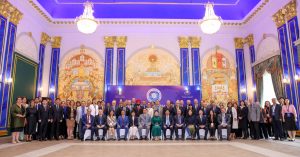Mongolia hosted the Eighth Ulaanbaatar Dialogue on Northeast Asian Security (UBD) in Ulaanbaatar from June 15 to 16. Given the increasing uncertainties in international affairs today, this year’s conference emphasized the significance of dialogue and cooperation, which is a critical mechanism in confidence-building measures.
According to the Office of the Foreign Ministry of Mongolia, participants from 30 countries and more than 180 international and national delegates and government representatives attended the 2023 UBD. That includes high-level representatives such as Nakamitsu Izumi, the United Nations’ under-secretary-general and high representative for disarmament affairs; Kim Gunn, the United States’ special representative for Korean Peninsula peace and security affairs; and Seyfullah Hacimuftuoglu, secretary general of Turkey’s National Security Council.
In her opening remarks, Mongolia’s Foreign Minister Battsetseg Batmunkh noted that Mongolia “has a long-standing and proud tradition of supporting multilateral cooperation efforts.” She added, “The UB Dialogue provides a vital opportunity for participants to exchange views on some of the most important issues currently facing the international community.”
Since its first international conference in 2014, the Ulaanbaatar Dialogue has expanded, involving more diverse profiled participants to enrich the dialogues and the perspectives on regional and global issues such as disarmament, arms control, energy connectivity, and the significance of confidence-building measures, especially concerning conflicting parties.
Northeast Asia has an increasing significance in regional and global security matters due to the number of nuclear weapons states and their role in maintaining both regional and global peace and security. Amid increasing tensions – whether between China and the U.S., the two Koreas, or China and Taiwan – the region’s defense expenditures continue to rise. That includes efforts by regional nuclear powers to build up their arsenals.
As Nakamitsu stated in her presentation at the UBD, “There has been a disturbing trend of regional nuclear-armed States increasing the role and significance of nuclear weapons in their security doctrines, contrary to decades of efforts by the international community to reduce and eliminate nuclear risks.”
For Mongolia, there is an increasingly pressing need to support peaceful solutions to many of the region’s protracted security issues. The UBD serves as confidence-building measure (CBM) to help bring contesting parties into conversation with each other.
In support of Mongolia’s UBD initiative, Izumi stated, “As the confidence-building measures take effect over time, they can stabilize bilateral and regional relationships, and help clarify shared security interests, further opening the space for trust and cooperation. Ultimately CBMs can serve as a baseline for the pursuit of legally binding measures and agreements on arms control and disarmament.”
This year’s UBD also included a session jointly organized by the Institute for Strategic Studies of Mongolia and the United Nations Department of Political and Peacebuilding Affairs, which created a platform for youth representatives to share their views and recommendations on regional peace and security with policymakers.
Mongolia’s Ulaanbaatar Dialogue is an important, consistent mechanism that seeks to strengthen understanding between actors, observers, and states that have historically been hostile toward each other. As geopolitical issues deepen and states are vulnerable to hostilities, whether historical or contemporary, it is important to hold open dialogues and present opportunities to challenge assumptions and presumptions. The UBD aspires to do just that.
Northeast Asia is a particular tense region in the security realm. With global powers and U.S. rivals such as Russia and China, U.S. allies Japan and South Korea, and nuclear-obsessed North Korea all in the region, there is no shortage of potential flashpoints. Russia’s 2022 invasion of Ukraine, coupled with the Wagner Group’s recent high-profile fallout with Russian President Vladimir Putin, imposes further stress on the already complex and interrelated security dilemmas in Northeast Asia.
For Mongolia, a democracy that is uncomfortably positioned between two nuclear powers and increasingly authoritarian states, the stakes are high. But so are its ambitions: Mongolia wants to see Ulaanbaatar become the region’s most prominent confidence-building mechanism. In May, Mongolia, South Korea, and the United States launched a trilateral meeting in support of maintaining a dialogue with North Korea. Ulaanbaatar’s diplomatic ties with Pyongyang are crucial in such efforts.
While international dialogues and multilateral round-table discussions open certain avenues of peace, Mongolia believes that the actual cooperation and the formulation of policies remain dependent on bilateral ties, diplomacy, and negotiation between states.

































